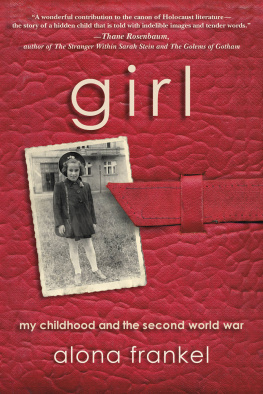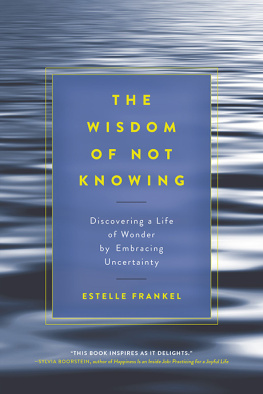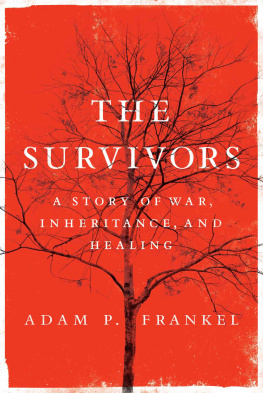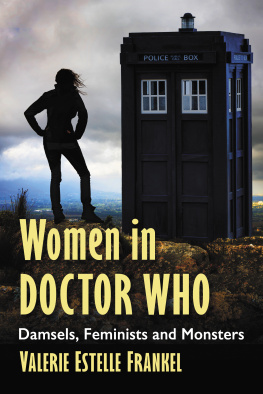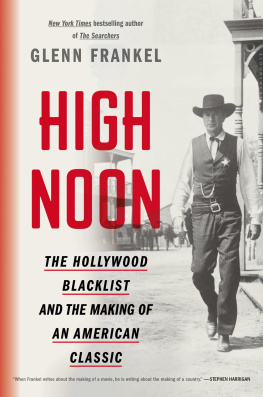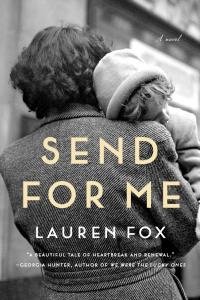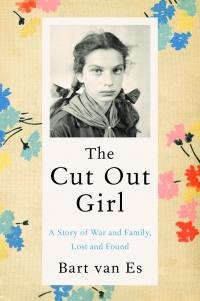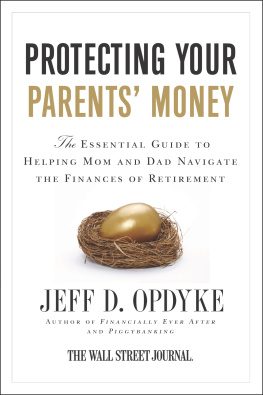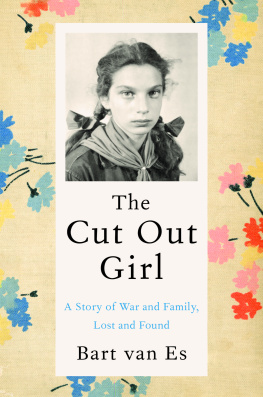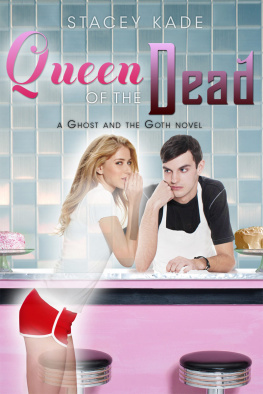
girl
girl
my childhood and the second world war
alona frankel
Translated from the Hebrew by Sondra Silverston
INDIANA UNIVERSITY PRESS
Bloomington & Indianapolis
This book is a publication of
Indiana University Press
Office of Scholarly Publishing
Herman B Wells Library 350
1320 East 10th Street
Bloomington, Indiana 47405 USA
iupress.indiana.edu
2016 by Alona Frankel
All rights reserved
Some names of individuals who were not family members have been changed throughout this book.
All images are from the United States
Holocaust Memorial Museum collection, donated by Alona Frankel.
No part of this book may be reproduced or utilized in any form or by any means, electronic or mechanical, including photocopying and recording, or by any information storage and retrieval system, without permission in writing from the publisher. The Association of American University Presses Resolution on Permissions constitutes the only exception to this prohibition.
The paper used in this publication meets the minimum requirements of the American National Standard for Information SciencesPermanence of Paper for Printed Library Materials, ANSI Z39.48-1992.
Manufactured in the United States of America
Library of Congress Cataloging-in-Publication Data
Names: Frankel, Alona, author.
Title: Girl : my childhood and the Second World War / Alona Frankel ; translated from the Hebrew by Sondra Silverston.
Other titles: Yaldah. English
Description: Bloomington and Indianapolis : Indiana University Press, [2016]
Identifiers: LCCN 2016003858| ISBN 9780253022288 (cl : alk. paper) | ISBN 9780253022356 (pb : alk. paper) | ISBN 9780253022417 (e-book)
Subjects: LCSH: Frankel, Alona. | JewsPolandBiography. | Jewish children in the HolocaustPolandBiography. | Holocaust, Jewish (1939-1945)PolandPersonal narratives.
Classification: LCC DS134.72.F724 A313 2016 | DDC 940.53/18092dc23 LC record available at http://lccn.loc.gov/2016003858
1 2 3 4 5 21 20 19 18 17 16
to my mother, Gusta Goldman, ne Gruber
to my father, Salomon Goldman
to my sons, Ari and Michael
Contents
girl
THEY WERE ALWAYS WITH ME. THE LICE, MY LICE.
I was familiar with two kinds of lice, head lice and clothes lice. Only later did I learn of the existence of another kind, pubic lice, from the four-volume Encyclopedia of Sexual Knowledge that survived from the Jewish gynecologists library. The doctor himself, his mother, wife, two daughters, and baby son were murdered by the Germans. That was at the beginning of the war.
When Hania Seremet took me out of the village where I was hiding, pretending to be a Christian child, and dumped me at my parents hiding place, I learned for the first time the difference between head lice and clothes licean important and meaningful difference.
When I was in the village, the lice never bothered me. They swarmed all over me, and of course I scratched constantly. I thought thats how it was in the world.
More than once, a careless louse would get caught under my nail. More than once one dropped out of my hair when I bent my head. What was the fate of such an adventurous louse that suddenly loses the head of its little Jewish girl? None of that worried me, everything was natural. Sleeping on straw in a coffin that was a bench by day and a bed by night. The horse, the cow, the stupid geese that nipped my ankles. The carrots, the corn, the wheat, the flowers. The mice, the lice, the bugs. The boiling potato soup that burned my palms and congealed into grayish vomit when it cooled. The old man, the grandfather, who spit his lungs out until he died, but not before he pulled my tooth with rusty carpenters pliers and rescued me from terrible pain.
It was my mother who was so very, very worried.
It was night when Hania Seremet dumped me at my parents hiding place. The room my parents were hiding in had two doors, one of them from the stairs. We never used that door, and no one imagined it could be opened, not even the buildings tenants. The room, a Jewish gynecologists office before the war, was now disguised as the carpentry shop of Mr. Juzef Juzak, carpenter and alcoholic. The other door was from the Juzaks apartment.
When the ghetto was about to be liquidated, the Juzaks were kind enough to hide my mother and father, but on one condition: that they come without the girl. Without me.
Softly, Hania Seremet knocked the agreed-upon knock on the staircase door. I sensed her anxiety and realized that fear has a smell. No one was allowed to see that door open. It would bring the Gestapo running, and that would be the end of all of us, including the Juzaks.
My mother, who must have been lying in wait for hours on the other side of the door, opened it instantly. Hania Seremet shoved me hard over the threshold. She tossed a bundle of papers and a bundle of rags, my clothes, after me. My green dress with the satin flowers, the one my mother made for me and sent to the village, the one I wore when my picture was taken with Hania Seremet in the photographers studio so she could send it to my mother and father as proof that I was still alivein addition to my drawings, which she sent from time to timethe green dress wasnt in the bundle of rags. Hania Seremet had obviously sold it.
Hania Seremet ran off quickly after finally getting rid of me. She must have breathed a sigh of relief, sure that we would all be dead before long. The smell of the sweat of her fear lingered.
Hania Seremet had wanted to get rid of me for a long time, but even so, she didnt throw me into the street like she did Daniel, the sweet boy she left at the ghetto gate after his parents were murdered in an aktion and there was no one to pay to keep him in the village. The ghetto had already been liquidated when Hania Seremet got rid of me, but even so, she didnt toss me into the street. Maybe she believed my mothers lies about her connection to the undergroundthe Polish underground, the AK, the Home Army, whose members were not known as Jew loversand about their promise to kill her the minute they found out I was dead, and theyd do it even though I was Jewish.
The meeting had been set up in an exchange of letters that arrived in the Juzaks name, written in a prearranged code.
The door closed behind me. The key scraped in the keyhole. The bolt fell into place.
I stood there. I thought thats how it was in the world.
I STOOD WITH MY BACK TO THE DOOR, MY PRECIOUS FORGED papers and the rags packed in a threadbare knapsack at my feet.
In front of me was a woman, my mother, thin and light-skinned, her lips sunken, her gold crowns pulled from her mouth in a series of exchangesa gold crown for another week in the village, another week on the Aryan side, the side of life, the life of the child, Ilonka, my life. A man stood behind her, my father. I didnt remember them.
I didnt remember who they were.
My mother said, Ilonka, Ilusia.
My father struck a match stub and lit a lamp, or maybe a candle.
They looked at me, and looked and looked. My mother wept silently. My father covered his face with his hands and smoothed back his hair, leaving his hands on his forehead and eyesa gesture that stayed with him till the day he died. His pale, high forehead invaded his dark, straight hair in two deep gulfs.
My mother picked me up, put me on the massive desk, undressed me and said, Ilonka, Ilusia, Ilitska. But I was Irenka. I knew that I was Irenka. I knew that I was Irena Seremet.
I saw and I was invisible.
Next page
